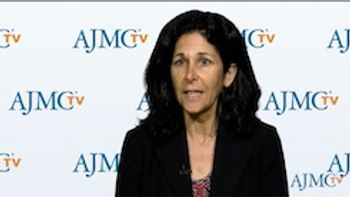
What we're reading, September 27, 2016: a panel of experts recommends expanding preventive services for women with no cost sharing; BlueCross BlueShield of Tennessee is exiting 3 Obamacare exchanges; and Pfizer will not split into 2 companies.

What we're reading, September 27, 2016: a panel of experts recommends expanding preventive services for women with no cost sharing; BlueCross BlueShield of Tennessee is exiting 3 Obamacare exchanges; and Pfizer will not split into 2 companies.

Analysis of prescription transaction data provided insight into reduced out-of-pocket spending and increased medical fill rates for people who gained coverage under the Affordable Care Act and had at least 1 chronic condition.

Patience and compromise will be key to healing political rifts caused by Medicaid expansion, explained Matt Salo, executive director of the National Association of Medicaid Directors.

Under the Affordable Care Act, health centers received federal funding to provide comprehensive primary care to patients in underserved communities. An analysis of Medicaid claims data in 13 states has found that these health centers reduced spending by 24% per Medicaid patient.

Readmission rates for both safety net hospitals and other hospitals have decreased since Medicare’s Hospital Readmissions Reduction Program went into effect in 2013. However, disparate rates of improvement could show that these hospitals in low-income areas are still at a disadvantage.

About half of people involved with the justice system are newly eligible for health insurance through the Affordable Care Act. While coverage is rising, one-third still lack insurance.

What we're reading, September 23, 2016: California's insurance commissioner wants to try a public option; Valeant avoids double-digit price hikes with 9.9% increases; maker of Suboxone being sued by 35 states and the District of Columbia for keeping generics off the market.

The integration of behavioral healthcare into a medical setting is being delayed by resistance from those benefiting from the current payment model, said Roger Kathol, MD, president of Cartesian Solutions, Inc., and adjunct professor of psychiatry at the University of Minnesota.

People who visit the emergency department (ED) for mental health care are transferred to another facility at a rate 6 times higher than people who visit EDs for non-psychiatric conditions, and they wait hours longer, as well

Ideally, the healthcare industry needs to be more consumer driven, so that solutions and programs are built with the patient in mind, said Jay Sheehy, senior vice president of product innovation at EmblemHealth.

Since the implementation of the Affordable Care Act, more and more individuals are gaining access to insurance. Therefore, part of the New Jersey Health Care Quality Institute's responsibility is to make the complexities of the healthcare industry more easily understandable for members, according to Linda Schwimmer, JD, president and CEO of the New Jersey Health Care Quality Institute

This week, the top managed care stories included news that Risa Lavizzo-Mourey, MD, MBA, will be leaving the Robert Wood Johnson Foundation, a report that obesity rate in the military are also on the rise, and CMS denied Ohio's proposal to charge fees for Medicaid.

Massachusetts achieved near-universal insurance coverage after enacting its own healthcare reform 10 years ago, but gains in improved access to and affordability of care faded over time.

The American Journal of Managed Care reached out to Daniel F. Hayes, MD, FASCO, 2016-2017 president of the American Society of Clinical Oncology (ASCO), to understand his perception of how the recommendations of the Cancer Moonshot initiative's Blue Ribbon Panel would impact cancer care in the United States.

Gaining access to Afrezza can mean battling with an insurer to cover it. Sometimes the first hurdle is getting a doctor to write a prescription, according to those who've been through the process.

Understanding patients’ capability for self-management is a key part of understanding the risk of health declines and avoidable utilization, researchers determine.

How does a state with almost no money launch Medicaid expansion? Louisiana health officials used data they already had, and in doing so, have created a model that could be used elsewhere.

Analysis of the rich data of US health insurers-pivotal players in the healthcare system-reveals continuing reductions in employer-provided group health insurance and increases in Medicaid members and utilizations following the Affordable Care Act.

What we're reading, September 14, 2016: CMS denies Ohio's proposal to charge Medicaid fees; steep costs of healthcare continue to push Americans into poverty; and Canada approves prescription heroin to treat severe addiction.

Between individuals coming in and out of the market in a given year and those who switch plans, the majority of people in exchanges are enrolled in their plans for one year or less.

Insurance companies are making it mandatory for individuals to speak with qualified genetic counselors prior to testing for some hereditary cancers.

What we're reading, September 13, 2016: GOP bill would exempt people who live in areas with 1 Obamacare plan or none from penalties for not having coverage; hepatitis C drugs threaten to bust prison budgets; and school challenges for children with mental illness.

Large insurers reducing their involvement in the Affordable Care Act health insurance exchanges doesn't necessarily indicate failure, but success is not guaranteed, said Michael E. Chernew, PhD.

While adoption of personal health records and electronic patient portals increased from 2012 to 2015, researchers at Weill Cornell Medical found that the adoption rates for Hispanics and low-income individuals have lagged behind non-Hispanics and higher-income individuals.

Two state-specific studies in Annals of Emergency Medicine provided insight into emergency department use and staffing since the implementation of the Affordable Care Act.

259 Prospect Plains Rd, Bldg H
Cranbury, NJ 08512
© 2025 MJH Life Sciences®
All rights reserved.
